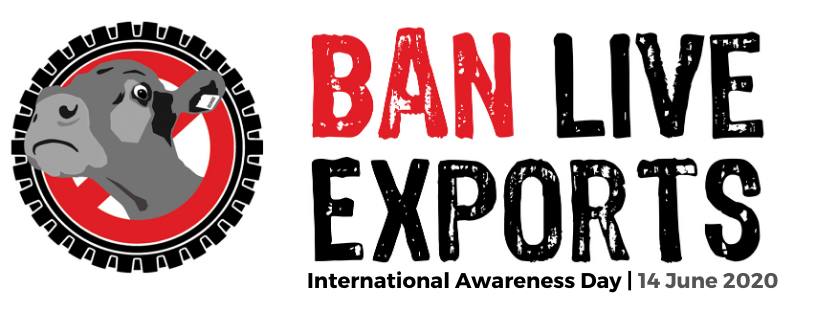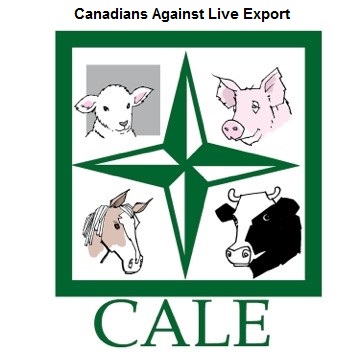Canada to send live export cattle to United Arab Emirates
December 28, 2011 bikyamasr.com
Canada announced this month that they would begin live exports to the United Arab Emirates as part of an effort to bolster trade between the two countries. The move has been met with anger by animal rights advocates, who argue live export is cruel and inhumane.
Canada’s agriculture ministry, however, believes the economic merits will outweigh the homegrown anger over the move. The ministry says that live cattle exported to the UAE will provide some $40 million in sales, bolstering the sector, which is home to some of the country’s strongest lobbyists. ********
“This announcement instantly provides new export opportunities for Canadian producers, and is a significant step toward regaining access to other key markets in the region,” said Agriculture Minister Gerry Ritz. “Our Government’s top priority remains the economy, and this new market access is good news for our hard working farmers across the country.”
But animal rights advocates plan to protest the move in Ottawa in the near future. They told Bikyamasr.com that the live export trade “should be abolished now and put an end to the abhorrent animal abuses that take place in the industry.”
Mary Youkles, a Ottawa resident who told Bikyamasr.com that she plans to use social media to create a campaign against the move, believes that the live export trade is one of the worst endeavors in modern technology. “So many animals are crammed onto these boats and many die along the way, which are then just dumped into the ocean as if they are meaningless. It is disgusting and for our government to get involved in this is wrong,” she said. But Canadian government officials disagree.
“This is great news for Canadian cattle exporters, and yet another example of how our government’s commitment to opening new markets for Canadian businesses and workers is getting results,” said Ed Fast, Minister of International Trade and Minister for the Asia-Pacific Gateway. “The UAE’s announcement advances our bilateral commercial relations, and will help our overall efforts to build on our economic and trade ties with the Gulf Cooperation Council region as a whole.”
The industry itself is promoting the move as a means of boosting Canada’s international trade. “We are pleased to have regained access to the UAE market,” said Rick McRonald, Executive Director of the Canadian Livestock Genetics Association. “This is good news for exporters who have been waiting to pursue this opportunity.”
Comment: PM Stephen Harper and the Conservatives have to go! A blatant disregard for animals has been demonstrated time and time again and begs the question as to whether this government has any scruples whatsoever.
October 15, 2018 Government of Canada secures new access in key ASEAN markets
“Canada is building strong markets around the world which will benefit our farmers and food processors. These recent market access gains are setting the stage for deeper bilateral economic relations between Canada and the ASEAN region, and will contribute to our government’s goal of reaching $75 billion in agri-food exports by 2025.” - Lawrence MacAulay, Minister of Agriculture and Agri-Food
Reference: Agriculture & Agri-Food Canada: Industry, Markets & Trade
Agriculture and Agri-Food Canada
November 23, 2018 Canada Has Long Exported Animal Cruelty By The Millions (excerpt)
The transportation of farmed animals over long distances, most frequently by ship, has received significant scrutiny from animal advocacy organizations and society in general since the first evidence of what animals endure during the journey began appearing in 2003.
In response to growing public concern and scrutiny, some of the largest exporting countries have ended the practice, sometimes temporarily, sometimes permanently. New Zealand effectively banned live export for the purpose of slaughter in 2007 after it was exposed that 4,000 sheep died on a ship bound for Saudi Arabia some years earlier.
Australian authorities have temporarily suspended live exports to a number of countries, including Saudi Arabia in 2003, Egypt in 2006, Indonesia in 2011, Gaza in 2013, Jordan in 2014, and specific facilities in Vietnam in 2016. Each suspension followed the release of footage showing inhumane transport conditions or horrific abuse in slaughterhouses upon arrival at the country of destination.
Although less widely known, Canada is one of the world's leading exporters of live animals and animal products. In 2014, Canada was the world's fifth-largest exporter of agriculture and agri-foods. Last year alone, Canada exported over 24 million live animals. Chicks and turkey poults accounted for the vast majority at over 17 million, with other young animals, such as calves and piglets, also intended for fattening, generally in the US, accounting for another nearly five million. The remaining two million animals endured the longest journeys, travelling thousands of kilometres by ship or cargo plane to countries where few to no animal welfare regulations exist.
 Not included
in this already staggering statistic are the nearly
40 million
fertilized eggs of various species exported by Canada. Information on what
becomes of these birds seems particularly elusive, but may include a delicacy
called balut, whereby a bird embryo (usually a duck) close to hatching is boiled
alive and eaten from the shell.
Not included
in this already staggering statistic are the nearly
40 million
fertilized eggs of various species exported by Canada. Information on what
becomes of these birds seems particularly elusive, but may include a delicacy
called balut, whereby a bird embryo (usually a duck) close to hatching is boiled
alive and eaten from the shell.
And the numbers continue to rise. The Canadian government announced in its 2017 budget its intention to increase overall agricultural exports by 40 per cent by 2025. Along with animal products, the goal includes expanding the number of live animals exported. Canadian politicians and industry leaders are particularly keen on expanding market shares in China. The agricultural press excitedly covers trade mission after trade mission with industry representatives joining federal ministers on expensive trips abroad. Just last week, the chair of Canadian Pork International accompanied Federal Minister of Agriculture and Agri-Food Lawrence MacAulay on a 10-day trade mission to China.
Comment: Canada’s federal government routinely sacrifices animal welfare and bows to industry in its relentless pursuit of profit. Meanwhile, the inhumane treatment of farm animals is resonating with ordinary Canadians, many of whom have and are modifying their diets to reflect their moral values.
Visit our Facebook page, Canadians Against Live Export
Take action - For the current status of Canadian politicians see: Members of Parliament, Canada
June 14, 2019 Compassion in World Farming Campaign -- Stop Live Export: International Awareness Day. Every year, millions of animals are exported on horrific journeys to countries in the Middle East, Sri Lanka, Vietnam and other nations. Many of them die from dehydration, starvation, disease or being trampled to death before even reaching the final destination. Once there, many will face unimaginably inhumane slaughter by often unskilled workers.
 This trade must end on legal and
moral grounds. In Canada, contact Marie-Claude Bibeau, Minister of Agriculture &
Agri-Food Canada
Marie-Claude.Bibeau@parl.gc.ca
and Prime
Minister Justin Trudeau
PM@pm.gc.ca
This trade must end on legal and
moral grounds. In Canada, contact Marie-Claude Bibeau, Minister of Agriculture &
Agri-Food Canada
Marie-Claude.Bibeau@parl.gc.ca
and Prime
Minister Justin Trudeau
PM@pm.gc.ca
Canada to sell 10,000 dairy cattle to Vietnam, live animal export news, stats, Cdn. Meat Council
